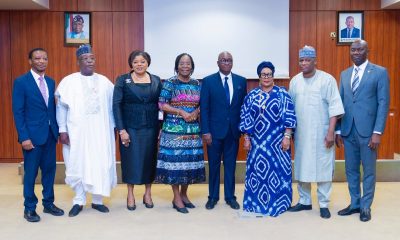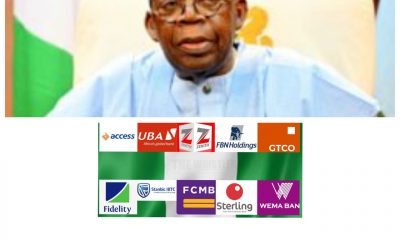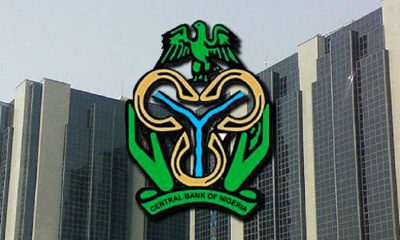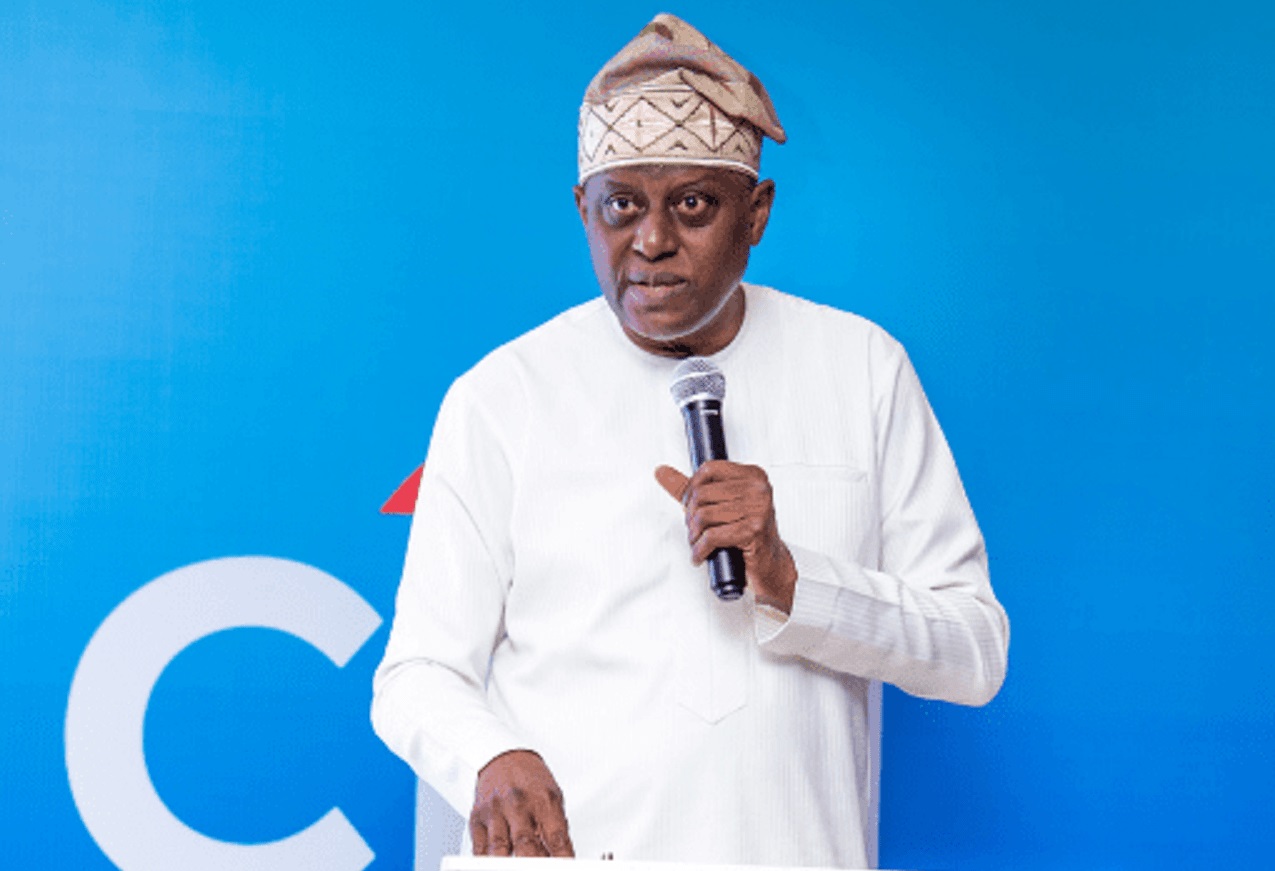Banking
CBN Warns Against Misinterpretation of Policy Guidelines
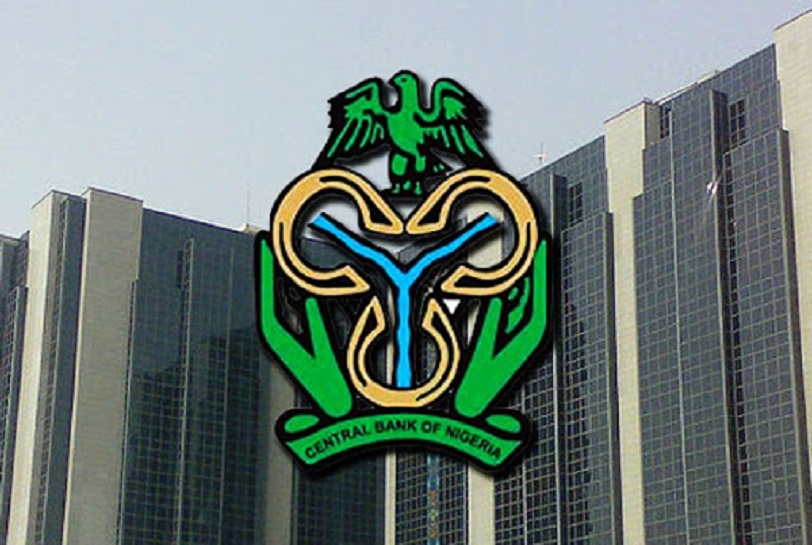
By Adedapo Adesanya
The Central Bank of Nigeria (CBN) has made some clarifications regarding the Monetary, Credit, Foreign Trade, And Exchange Policy Guidelines For Fiscal Years 2024 – 2025 document earlier published on Tuesday, September 17, 2024.
It disclosed this in a statement published on its website on Friday.
The apex bank revoked the document, saying that the move was to minimise risks of any further misrepresentation or misinterpretation, resulting in confusion among stakeholders.
“The attention of the Central Bank of Nigeria (CBN) has been drawn to certain instances of misinterpretation or misrepresentation of its biennial publication on Monetary, Credit, Foreign Trade, and Exchange Policy Guidelines published on September 17, 2024. In response, the CBN has temporarily withdrawn the document to minimise the risk of any further misrepresentation.
“As is stated explicitly in the document to guide stakeholders, the CBN reiterates that the publication is a compilation of previously issued policies and guidelines issued by the Bank up to a cut-off date, typically December 31 of the relevant year.”
It noted that the current document is intended to achieve certain objectives, including being a single reference source for the ease and convenience of stakeholders, a valid compilation of policies, directives, and guidelines for adjudication in conflict situations involving stakeholders, and additional clarification of policies and guidelines.
“As a compendium of previously issued policies and guidelines, the provisions are applicable only to the extent that there have been no updates or revisions to the guidelines and policies contained therein. This is stated explicitly in the document to guide stakeholders.
“In line with prior editions, the most recent publication (January 2024) contains policies and guidelines issued by the Bank up to 31st December 2023, some of which will remain relevant during the period 2024 – 2025. However, several others may cease to apply owing to revisions or updates that become applicable in the aftermath of its publication.
“This is clearly stated in the document as follows: The Guidelines may be adjusted by the CBN without prior notice, to address new developments in the domestic and global economies in the period. However, such amendments shall be communicated to the relevant institutions/ stakeholders in supplementary circulars (Page 8, Paragraph 1).
“The publication further provides the public with avenues for obtaining clarifications on the whole or any part of the document on pages 147 and 148.
“In the light of these clarifications, we ask stakeholders to note the following:
“Some recent media publications referencing aspects of the Guidelines refer to policy positions of the Bank issued prior to 31st December 2023, which have changed in the light of revisions and updates in 2024. One example is the Cyber Security Levy, which was suspended in May 2024, superseding the circular reported in the Guidelines.
“Certain technical aspects of the Guidelines have been widely misreported and misrepresented. For example, reports have mistakenly sought to link the fuel subsidy removal to external reserves. Such reports essentially missed the analytical basis for the original statement, which was intended to observe a potential risk that was to be mitigated by the policy. More recently, policies of the Bank around the Naira exchange rate and those of the fiscal authorities have positively altered the outlook of the subject in question.
“In summary, the Guidelines must primarily be viewed as a record of policies, circulars and directives issued by the Bank up to the end of 2023. They are not new directives and should not be reported as such.
“The Bank will continue to provide clear monetary policy direction and advice for the overall good of the Economy. We urge all stakeholders to seek clarification of information about the Bank before publishing.”.
The release of the document spurred some reports, excluding Business Post, which interpreted that the lender will sustain its Ways and Means Advances to the federal government at a 5 per cent limit for the fiscal years 2024-2025.
This is contrary to a bill passed by the National Assembly which raised the maximum borrowing percentage in the Act from five per cent to ten per cent.
Banking
Public Offer: Sterling Holdco Allots 13.812 billion Shares to 18,276 Shareholders

By Aduragbemi Omiyale
Sterling Financial Holdings Company Plc has allotted shares from its public offer of 2025 to investors with valid applications.
The allotment follows the earlier receipt of final approval from the Central Bank of Nigeria (CBN) and the recent clearance by the Securities and Exchange Commission (SEC).
In September 2025, the financial institution offered for sale about 12,581,000,000 ordinary shares of 50 kobo each at N7.00 per share in public offer.
However, the exercise received wide participation from the investing public, with the company getting 18,280 applications for 16,839,524,401 ordinary shares valued at approximately N117.88 billion.
Following a thorough verification process, valid applications were received from 18,276 shareholders for a total of 13,812,239,000 ordinary shares, representing a subscription level of 109.79 per cent and reflecting sustained confidence in Sterling Holdco’s strategic direction, governance, and long-term growth prospects.
The firm approached the capital market for additional funds for the recapitalisation of its two flagship subsidiaries, Sterling Bank and The Alternative Bank.
The capital injection will support the commencement of full operations and contribute to the group’s revenue diversification objectives.
In line with the guidelines set out in the offer prospectus, Sterling Holdco confirmed that all valid applications will be allotted in full. Every investor who complied with the terms of the offer will receive all the shares for which they applied.
A very small number of applications were not processed or were partially rejected due to non-compliance with the offer terms, including duplicate payments and failure to meet the minimum subscription requirement of 1,000 units or its multiples, as stipulated in the offer documents.
The group ensures a seamless post-offer process, with refunds for excess or rejected applications, along with applicable interest, to be remitted via Real Time Gross Settlement or NIBSS Electronic Funds Transfer directly to the bank accounts detailed in the application forms.
Simultaneously, the electronic allotment of shares has be credited to successful shareholders’ accounts with the Central Securities Clearing System (CSCS) on February 17, and for applicants who do not currently have CSCS accounts, their allotted shares will be temporarily held in a registrar-managed pool account pending the submission of their completed account opening documentation to Pace Registrars Limited, after which the shares will be transferred to their personal CSCS accounts.
Banking
CBN Governor Seeks Coordinated Digital Payment Reforms

By Modupe Gbadeyanka
To drive inclusive growth, strengthen financial stability, and deepen global financial integration across developing economies, there must be coordinated reforms in digital cross-border payments.
This was the submission of the Governor of the Central Bank of Nigeria (CBN), Mr Olayemi Cardoso, at the G‑24 Technical Group Meetings in Abuja on Thursday, February 19, 2026.
According to him, high remittance costs, settlement delays, fragmented systems, and heavy compliance burdens still limit the participation of households and Micro, Small and Medium Enterprises (MSMEs) in global trade.
The central banker emphasised that efficient payment systems are essential for economic inclusion, highlighting that global remittance corridors still incur average costs above 6 per cent, with settlement delays of several days, excluding millions from modern economic activity.
Mr Cardoso cautioned that while digital payments present significant opportunities, they also carry risks such as currency substitution, weakened monetary transmission, increased FX volatility, capital-flow pressures, and regulatory fragmentation.
The G-24 TGM 2026, themed Mobilising finance for sustainable, inclusive, and job-rich transformation, convened global financial stakeholders to advance the modernisation of finance in support of emerging and developing economies.
The CBN chief reaffirmed Nigeria’s commitment to working with G-24 members, the IMF, the World Bank Group, and other partners to build a more inclusive, resilient, and development-oriented global financial architecture.
“We have strengthened our AML/CFT frameworks in line with FATF guidelines, requiring strict dual-screening of cross-border transactions to mitigate risks.
“To deepen regional integration, the CBN introduced simplified KYC/AML requirements for low-value cross-border transactions to encourage broader participation in PAPSS, easing processes for Nigerian SMEs and enabling faster intra-African trade payments.
“We have also embraced fintech innovation through our Regulatory Sandbox, allowing payment-focused fintechs to test secure, instant cross-border solutions under close CBN supervision,” he disclosed.

Banking
Unity Bank, Providus Bank Merger Awaits Final Court Approval

By Modupe Gbadeyanka
The merger and business combination between Unity Bank Plc and Providus Bank Limited remains firmly on course, a statement from one of the parties disclosed.
According to Unity Bank, there is no iota of truth in reports in certain sections of the media suggesting that the merger process had stalled, as the transaction remains firmly on track.
It was disclosed that the necessary regulatory steps have been completed, but only a few other steps to finalise the transaction, especially the final court sanction.
There had been speculations that both lenders may not meet the new minimum capital requirement of the Central Bank of Nigeria (CBN) before the March 31, 2026, deadline.
However, it was noted that the combined capital base of Unity Bank and Providus Bank exceeds N200 billion, which is the minimum requirement to retain a national banking licence under the CBN’s recapitalisation framework.
When completed, the Unity-Providus merger is expected to deliver a stronger, more competitive, and customer-centric financial institution — one with the scale, innovation, and reach to redefine the retail and SME banking landscape in Nigeria.
“The merger with Providus Bank significantly enhances our capital base, operational capacity, and strategic positioning.
“We are confident that the combined institution will be better equipped to support economic growth and deliver innovative financial solutions across Nigeria,” the chief executive of Unity Bank, Mr Ebenezer Kolawole, stated.
Recall that a few months ago, shareholders authorised the merger between the two entities at Court-Ordered Meetings. They also adopted the scheme of merger at their respective Extraordinary General Meetings (EGMs) in September 2025,
The central bank also backed the merger, with a pivotal financial accommodation to support the transaction. The merger also received a further boost with a “no objection” nod from the Securities and Exchange Commission (SEC).
The regulatory approvals form part of broader efforts to strengthen the resilience of Nigeria’s banking system, reinforce capital adequacy across the sector, and mitigate potential systemic risks.
The development positions the combined entity among the 21 banks that have satisfied the apex bank’s new capital threshold for national banking operations.
-

 Feature/OPED6 years ago
Feature/OPED6 years agoDavos was Different this year
-
Travel/Tourism10 years ago
Lagos Seals Western Lodge Hotel In Ikorodu
-

 Showbiz3 years ago
Showbiz3 years agoEstranged Lover Releases Videos of Empress Njamah Bathing
-

 Banking8 years ago
Banking8 years agoSort Codes of GTBank Branches in Nigeria
-

 Economy3 years ago
Economy3 years agoSubsidy Removal: CNG at N130 Per Litre Cheaper Than Petrol—IPMAN
-

 Banking3 years ago
Banking3 years agoSort Codes of UBA Branches in Nigeria
-

 Banking3 years ago
Banking3 years agoFirst Bank Announces Planned Downtime
-

 Sports3 years ago
Sports3 years agoHighest Paid Nigerian Footballer – How Much Do Nigerian Footballers Earn


